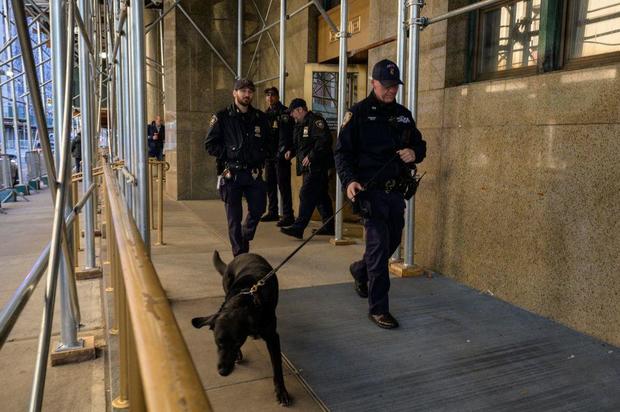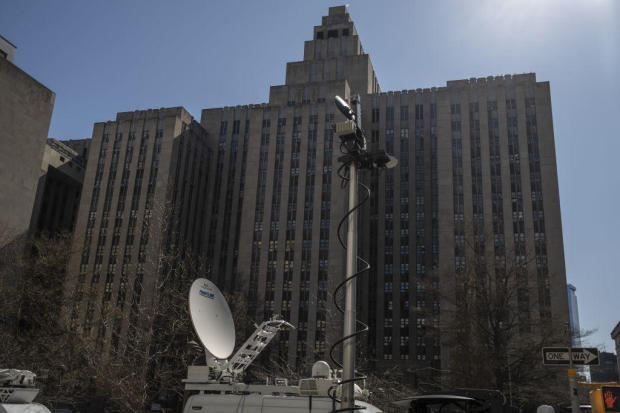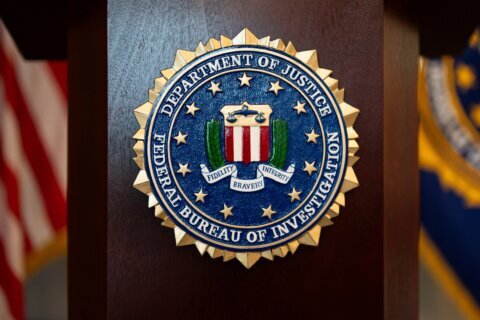▶ Watch Video: Examining the implications of Trump’s indictment
Washington — The decision by a New York grand jury to indict former President Donald Trump is a historic one, and kicks off what is expected to be a lengthy legal battle between prosecutors and Trump’s attorneys.
The Manhattan District Attorney’s Office confirmed the indictment on Thursday and said it was coordinating with Trump’s attorneys for his surrender. Details of the charge or charges remain under seal, but the grand jury has been conducting an investigation related to a payment that Trump’s lawyer made to adult film star Stormy Daniels before the 2016 presidential election. Daniels in turn agreed to keep silent about an affair she said she had with Trump in 2006.
The former president has denied any involvement with Daniels and called the indictment “Political Persecution and Election Interference at the highest level in history” in a statement on Thursday.
The decision by the grand jury to indict Trump is the culmination of a sprawling investigation into an alleged scheme that first came to light years ago, when Trump was still in the White House. The forthcoming court battle sparked by Trump’s indictment is taking place as he ramps up a third bid for the presidency in 2024.
Now that the grand jury has voted to indict Trump, here is what is likely to come next, according to a former prosecutor and the typical process for criminal defendants in New York:
Surrender and processing
In New York, after a grand jury returns an indictment, the charges remain sealed and the indictment is submitted to the court. The district attorney then typically notifies the defendant and arranges for his or her surrender.
District Attorney Alvin Bragg’s office confirmed that prosecutors “contacted Mr. Trump’s attorney to coordinate his surrender to the Manhattan D.A.’s Office for arraignment on a Supreme Court indictment, which remains under seal. Guidance will be provided when the arraignment date is selected.”
Two sources familiar with the matter told CBS News that Trump could be arraigned Tuesday in New York. The plan is for the former president to fly to New York on Monday and be arraigned before Judge Juan Merchan the next day. The proceeding is expected to be brief. The charge or charges in the indictment would be read to him at that time. The sources noted that the planning is fluid and the date could change.
Trump’s status as a former president adds an unprecedented dimension to the case and raises more security concerns surrounding his surrender than even the most high-profile defendants, according to Dan Horwitz, a former assistant district attorney in the Manhattan District Attorney’s Office. Speaking before the indictment was handed down, Horwitz said it’s not unusual in white-collar criminal cases for the defendant to turn him or herself in at the courthouse in lower Manhattan, where the district attorney’s office is.

But concerns from the Secret Service will likely make the process a bit different, Horwitz said. Trump will likely arrive through a nonpublic entrance, where he would then be in police custody, according to Horwitz.
“Once he surrenders, it’s going to be a little bit of the same and a little bit different,” Horwitz said.
After they surrender, defendants are processed behind closed doors, have their mugshots taken and are fingerprinted before being escorted to a courtroom for arraignment.
Arraignment
“It’s a criminal case, and notwithstanding all of the media hype and everything that’s being spun, there’ll be an orderly process that follows any criminal case,” Horwitz said.
The judge presiding over the proceedings will present the charges against the former president, and Trump will enter a plea. The case is not expected not to be one where bail will be set, meaning Trump will likely then be released.
While judges in federal court often set travel restrictions on certain defendants, Horwitz said New York state courts do not.
The judge will then set a schedule for filing standard motions, and the parties will discuss turning over the evidence collected by prosecutors during the investigation, as they are obligated to do.
Pre-trial proceedings
Horwitz said the motions process could take several months, and he pointed to the case involving former Trump Organization chief financial organization Allen Weisselberg as illustrative of what the timeline could look like.
It’s likely that Trump’s attorneys will move to dismiss the case or file motions relating to other issues tied to the indictment, as well as try to have certain evidence excluded or request a change of venue.
The evidence collected by Bragg’s team during the investigation is not public knowledge, and grand jury proceedings are secret. But Trump’s GOP allies have suggested Michael Cohen, Trump’s former lawyer and “fixer,” could be prosecutors’ star witness.
Cohen played a central role in arranging the payment to Daniels and testified before the grand jury twice this month. He pleaded guilty to federal charges in 2018, including campaign finance violation related to that payment. Trump has denied any involvement with Daniels.
Horwitz predicted prosecutors will bring a case with a “solid amount of corroboration,” rather than relying solely on Cohen.

When it comes to the jury pool and efforts to move any eventual trial from Manhattan, the crucial question is not whether prospective jurors know who the defendant is — many high-profile people are routinely prosecuted in federal and state courts in New York City — but whether they can be fair and impartial.
“Picking a jury in any case is a challenge. You want jurors to be fair and impartial. You’re looking for people who are going to keep an open mind, [who] might be sympathetic to what your defense is,” Horwitz said. “But it’s a challenge in a case like this with a high-profile defendant who is somebody who’s got means. You might very well hire a jury consultant.”
Trump’s attorneys could question the impartiality of the juror pool in Manhattan, arguing that because New York is a liberal city, it would be difficult to find jurors who are not politically biased.
“The argument is, are there other areas in New York State that are not as blue? And the answer is, sure,” Horwitz said. “I would be shocked if [Trump’s team] didn’t try to use the change of venue for legal tactical and political reasons.”
It’s not uncommon for a defendant to ask for a change of venue — movie mogul Harvey Weinstein unsuccessfully tried to move his sexual assault trial out of New York City — but it is rare for a judge to grant the motion.
Trump’s legal team could also request a bench trial, which does not involve a jury and is conducted by the judge alone. Unlike in federal court where the prosecution and defense have to consent to a bench trial, only the defense can ask for a judge-only trial in state court.
The decision on whether to seek a bench trial also doesn’t have to be made until the day the trial begins, which gives defense lawyers time to see how things play out during pre-trial proceedings.
Bench trials are typically held in cases involving complex legal and factual issues, and in matters where the defense’s theory may be more technical.







